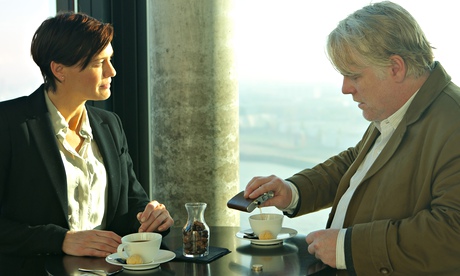
A weirdly bracing atmosphere of disillusion pervades Anton Corbijn’s superbly composed and controlled movie, adapted by the Australian screenwriter Andrew Bovell from John le Carré’s 2008 spy novel, and featuring an outstandingly wintry performance from Philip Seymour Hoffman in his final leading role on screen. The all-encompassing cynicism induces a stark kind of clarity, for the audience if not the fictional participants. This film is pregnant with ideas, and an awful kind of disquiet.
What the debacle of Burgess and Maclean was for the world of Tinker Tailor Soldier Spy in the early 70s, so 9/11 is for the international intelligence community in this tense drama, set among quarrelling spies in Hamburg, where a decade previously the WTC kamikaze attacks had been planned. This is a world of agents arguing about the size and shape of bolts to be affixed to the barn door, strenuously competing with each other to assess the horse’s sickening absence, and yet tormented with the thought that a second horse might yet suddenly emerge from the hay.
The spycraft on offer looks modern and yet in some ways as old as the hills. USB sticks with top-secret material are gingerly removed from packs of cigarettes bought with a curt exchange of gaze-avoiding pleasantries from a trusted vendor. Chiefs have Ipcress-File-style turf spats, tumblers of scotch are gulped in the middle of the day, great big tank-like Mercs are driven around, and spies in male-female pairings pretend to be snogging while carrying out surveillance – that time-honoured device for spy movies to sneak in a bit of sexiness.
Günther Bachmann is the dishevelled German spymaster running a covert, deniable operation to root out jihadis in Hamburg; he is played with a rumpled worldliness by Hoffman, looking like a hungover panda, his great bristly eyebrows often arched up in fatigue and pain. At one stage, Hoffman emerges from a helicopter and staggers towards the camera while tucking his shirt in, a lonely, unhappy unmade-bed of a man. He speaks English with a German accent, a convention that has the effect of tamping down some of the mannerisms that this actor was perhaps a little prone to. The resulting speaking voice has something of Anthony Hopkins about it. Bachmann’s team have located an illegal Chechen immigrant and suspected terrorist called Karpov (Grigoriy Dobrygin). He is not the usual penniless asylum seeker: Karpov has a letter of introduction to a sinister private banker, Thomas Brue (Willem Dafoe) and, to the authorities’ astonishment, this man now wishes to clean out a certain numbered account. Glowering intelligence chief Dieter Mohr (Rainer Bock) wants to bring in Karpov straightaway, but Bachmann urges hanging back, because Karpov might lead them to someone higher up the command chain, and appears to have the support of a CIA operative, Martha Sullivan (Robin Wright). Yet Bachmann’s perceived laxity enrages his supposed colleagues and increasingly the chief suspect, the most wanted man, could be Bachmann himself.
The suspected Chechen terrorist puts the story at the nexus of toxic bad faith in post-cold-war relations. After 9/11, America was concerned with the war on terror, and had no energy to devote to the apparently obsolete issue of challenging Russian expansionism: their wars in Chechnya were in any case widely seen as an entirely understandable battle with Islamic terrorism. Corbijn’s film tacitly indicates how Karpov himself, though haunted by a split ancestry of Chechens and Russians, also effectively has a third political parent for his current existence: America, along with its ally Germany.
As for Bachmann, what is his game plan? It is a question that Robin Wright’s CIA agent puts to him politely and
repeatedly. Does he really want to let Karpov lead to a bigger fish, and then another even bigger fish? Or is he now simply concerned with his own realpolitik, never bringing down a top spy, never achieving an ethical or ideological victory, but just managing the situation, simply owning and running compromised figures, for fear that destroying them will create a dangerous void for unknown new players?
Hoffman’s Bachmann is not the taciturn and pathetic George Smiley as imagined by Gary Oldman or Alec Guinness, but he is a wan, exhausted figure, burdened with his own fathomless vision of the unending not-so-great game, and perhaps ennobled by his determination to make the best of it. It is a commanding performance from Hoffman, and an overwhelmingly satisfying note for this actor to end on.
- This article was amended on 11 September, to clarify this is Hoffman’s final leading role

